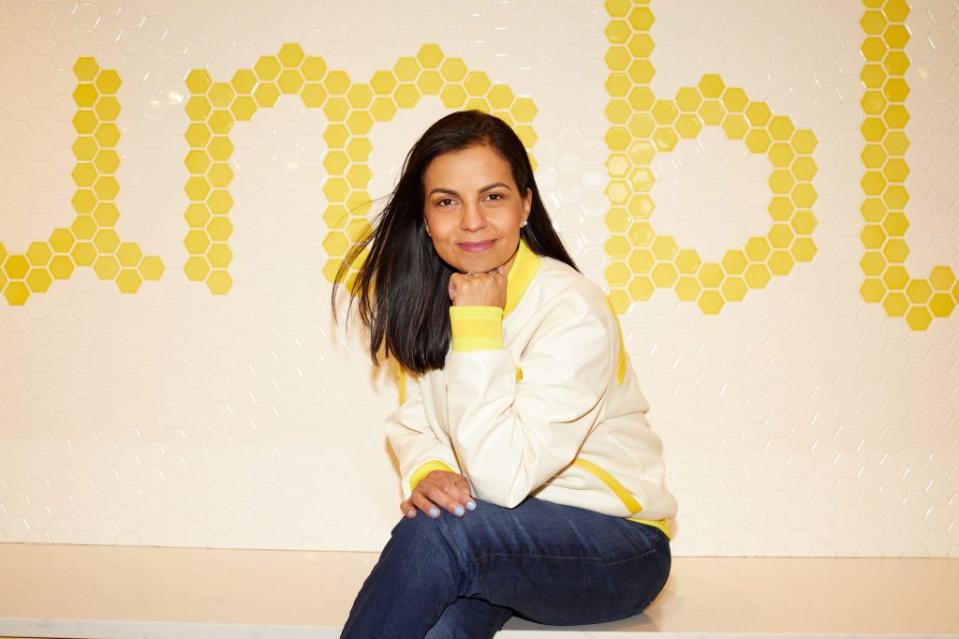Bumble’s new CEO reconsiders dating app’s signature feature of women making the first move: ‘It feels like a burden’
Good morning, Broadsheet readers! Today is Equal Pay Day, AI researcher Fei Fei Li prods President Biden for more resources, and Bumble's new CEO reconsiders the app's signature feature. Have a lovely Tuesday.
- The new move. Since Whitney Wolfe Herd founded Bumble a decade ago, the dating app's calling card has always been that women "make the first move." From Bumble's product to its branding, the company has encouraged women to send the first message to men on its dating app and extended that philosophy to a broader mission of women's empowerment.
But new Bumble CEO Lidiane Jones is reconsidering whether women "making the first move" still makes sense. "It's obviously been our signature," says Jones, who took over as Bumble Inc. chief at the beginning of this year after Wolfe Herd stepped down and became executive chair. "But it feels like a burden for a subset of our customers today."
When Bumble was founded, one of the main problems women faced on dating apps was the deluge of messages from men on leading competitor Tinder. Bumble's requirement that women (in heterosexual pairings) send the first message to men was meant to solve that problem. But in 2024, daters' problems are different—dating apps are in their "flop era," some users say, and sending the first message feels like extra work in a sea of unsatisfying swipes rather than empowerment.
The company has been "iterating on a different set of experiences," Jones says, that help women start conversations or cede that responsibility to someone else. "What it means to be an empowered woman today [is] that you feel in control of your experience," she says. One option lets women choose pre-composed opening lines when they set up their accounts, which reduces the anxiety of what to say to a new match. Another model could allow men to send the first message. Overall, Jones aims to improve the "quality of profiles," improving the profiles of users who haven’t added enough photos or filled out their bio—a common complaint among dissatisfied Bumble users. The app has started testing these options in New Zealand and Australia, Jones says.
Reevaluation of whether "make the first move" is still right for Bumble started under Wolfe Herd before Jones took over as CEO, Jones says. Now, Bumble is working toward a relaunch sometime in the second quarter of 2024.

That relaunch would also aim to solve some of Bumble's business challenges. Its share price is down almost 9% over the past year, trading at $11.19 yesterday—about 80% below its 2021 IPO high. Dating apps have struggled with consumers canceling paid subscriptions while tightening their budgets amid high inflation. In 2023, Bumble Inc. posted just over $1 billion in total revenue.
Since stepping into the CEO job, Jones has overhauled her executive team, bringing in former colleagues from Slack and Sonos, and laid off 350 employees. She restructured the company from a general manager to a functional model; there are no more GMs running individual apps across the Bumble Inc. portfolio (which also includes Badoo, Fruitz, and Bumble for Friends) but instead a head of technology overseeing all apps.
Jones joined Bumble from Salesforce-owned Slack. As Slack CEO, she was focused on workplace communication. She compares her new job to the transitions she made earlier in her career between enterprise and consumer. "At Slack, I didn't spend as much time thinking about your emotional state. I wanted you to be productive—that was very important there," she says. "A product like [Bumble's] is so personal—we want to understand your emotional journey."
Emma Hinchliffe
emma.hinchliffe@fortune.com
The Broadsheet is Fortune's newsletter for and about the world's most powerful women. Today's edition was curated by Joseph Abrams. Subscribe here.
This story was originally featured on Fortune.com
